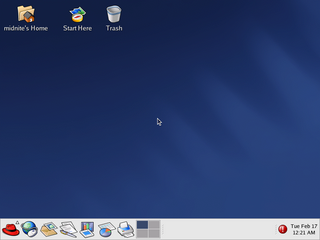
Red Hat Linux was a widely used commercial open-source Linux distribution created by Red Hat until its discontinuation in 2004.
OpenVPN is a virtual private network (VPN) system that implements techniques to create secure point-to-point or site-to-site connections in routed or bridged configurations and remote access facilities. It implements both client and server applications.
IPFilter is an open-source software package that provides firewall services and network address translation (NAT) for many Unix-like operating systems. The author and software maintainer is Darren Reed. IPFilter supports both IPv4 and IPv6 protocols, and is a stateful firewall.
iptables is a user-space utility program that allows a system administrator to configure the IP packet filter rules of the Linux kernel firewall, implemented as different Netfilter modules. The filters are organized in a set of tables, which contain chains of rules for how to treat network traffic packets. Different kernel modules and programs are currently used for different protocols; iptables applies to IPv4, ip6tables to IPv6, arptables to ARP, and ebtables to Ethernet frames.
Netfilter is a framework provided by the Linux kernel that allows various networking-related operations to be implemented in the form of customized handlers. Netfilter offers various functions and operations for packet filtering, network address translation, and port translation, which provide the functionality required for directing packets through a network and prohibiting packets from reaching sensitive locations within a network.
Shorewall is an open source firewall tool for Linux that builds upon the Netfilter (iptables/ipchains) system built into the Linux kernel, making it easier to manage more complex configuration schemes by providing a higher level of abstraction for describing rules using text files. Its documentation is hosted on shorewall.org, while the latest code is hosted at https://gitlab.com/shorewall/code.

Firestarter is a personal firewall tool that uses the Netfilter (iptables/ipchains) system built into the Linux kernel. It has the ability to control both inbound and outbound connections. Firestarter provides a graphical interface for configuring firewall rules and settings. It provides real-time monitoring of all network traffic for the system. Firestarter also provides facilities for port forwarding, internet connection sharing and DHCP service.

ipfirewall or ipfw is a FreeBSD IP, stateful firewall, packet filter and traffic accounting facility. Its ruleset logic is similar to many other packet filters except IPFilter. ipfw is authored and maintained by FreeBSD volunteer staff members. Its syntax enables use of sophisticated filtering capabilities and thus enables users to satisfy advanced requirements. It can either be used as a loadable kernel module or incorporated into the kernel; use as a loadable kernel module where possible is highly recommended. ipfw was the built-in firewall of Mac OS X until Mac OS X 10.7 Lion in 2011 when it was replaced with the OpenBSD project's PF. Like FreeBSD, ipfw is open source. It is used in many FreeBSD-based firewall products, including m0n0wall and FreeNAS. A port of an early version of ipfw was used since Linux 1.1 as the first implementation of firewall available for Linux, until it was replaced by ipchains. A modern port of ipfw and the dummynet traffic shaper is available for Linux and Microsoft Windows. wipfw is a Windows port of an old (2001) version of ipfw.
Netlink is a socket family used for inter-process communication (IPC) between both the kernel and userspace processes, and between different userspace processes, in a way similar to the Unix domain sockets available on certain Unix-like operating systems, including its original incarnation as a Linux kernel interface, as well as in the form of a later implementation on FreeBSD. Similarly to the Unix domain sockets, and unlike INET sockets, Netlink communication cannot traverse host boundaries. However, while the Unix domain sockets use the file system namespace, Netlink sockets are usually addressed by process identifiers (PIDs).
Sentry Firewall is a free open-source network firewall Linux distribution that was first published in 2001 and has been the subject of multiple magazine reviews. The distribution is particularly notable because it consists solely of a bootable CD-ROM that is designed to be used in a computer with no hard disk. Configuration information is retrieved at boot time by automatically searching on an attached floppy disk drive, USB flash memory drive, or another server on the local network willing to provide the configuration.
The Linux booting process involves multiple stages and is in many ways similar to the BSD and other Unix-style boot processes, from which it derives. Although the Linux booting process depends very much on the computer architecture, those architectures share similar stages and software components, including system startup, bootloader execution, loading and startup of a Linux kernel image, and execution of various startup scripts and daemons. Those are grouped into 4 steps: system startup, bootloader stage, kernel stage, and init process.

Fail2Ban is an intrusion prevention software framework. Written in the Python programming language, it is designed to prevent brute-force attacks. It is able to run on POSIX systems that have an interface to a packet-control system or firewall installed locally, such as iptables or TCP Wrapper.
The arptables computer software utility is a network administrator's tool for maintaining the Address Resolution Protocol (ARP) packet filter rules in the Linux kernel firewall modules.
Uncomplicated Firewall (UFW) is a program for managing a netfilter firewall designed to be easy to use. It uses a command-line interface consisting of a small number of simple commands, and uses iptables for configuration. UFW is available by default in all Ubuntu installations since 8.04 LTS. UFW has been available by default in all Debian installations since 10.
nftables is a subsystem of the Linux kernel providing filtering and classification of network packets/datagrams/frames. It has been available since Linux kernel 3.13 released on 19 January 2014.
cgroups is a Linux kernel feature that limits, accounts for, and isolates the resource usage of a collection of processes.
firewalld is a firewall management tool for Linux operating systems. It provides firewall features by acting as a front-end for the Linux kernel's netfilter framework. firewalld's current default backend is nftables. Prior to v0.6.0, iptables was the default backend. Through its abstractions, firewalld acts as an alternative to nft and iptables command line programs. The name firewalld adheres to the Unix convention of naming system daemons by appending the letter "d".

Zephyr is a small real-time operating system (RTOS) for connected, resource-constrained and embedded devices supporting multiple architectures and released under the Apache License 2.0. Zephyr includes a kernel, and all components and libraries, device drivers, protocol stacks, file systems, and firmware updates, needed to develop full application software.

Windows Subsystem for Linux (WSL) is a feature of Microsoft Windows that allows for using a Linux environment without the need for a separate virtual machine or dual booting. WSL is installed by default in Windows 11. In Windows 10, it can be installed either by joining the Windows Insider program or manually via Microsoft Store or Winget.

Azure Linux, previously known as CBL-Mariner, is a free and open-source Linux distribution that Microsoft has developed. It is the base container OS for Microsoft Azure services and the graphical component of WSL 2.






